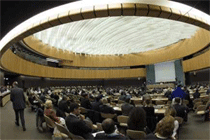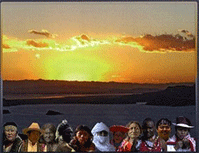
 With the adoption of the Universal Periodic Review (UPR) by the Human Rights Council, NGOs are certainly right to believe that this system is the opportunity to make their voice heard on behalf of civil society. Nevertheless, they must keep a watchful eye on a mechanism that is placed under full control of governments and their interests. More
With the adoption of the Universal Periodic Review (UPR) by the Human Rights Council, NGOs are certainly right to believe that this system is the opportunity to make their voice heard on behalf of civil society. Nevertheless, they must keep a watchful eye on a mechanism that is placed under full control of governments and their interests. More
 After 20 years of debates and discussion, the Declaration of Native Peoples was recently adopted by a majority of members of the General Assembly of the United Nations. This was above all a symbolic victory for the some 370 million indigenous people in the world. In effect, if on the one hand this Declaration constitutes a not insignificant sign recognising the existence of these peoples, on the other hand it is only that, as it has been stripped of any restrictive power at the legal level. Nevertheless it does signal progress for the indigenous peoples of Latin America, where the memory of the pre-Colombian past appears to have resurfaced on the political landscape. More
After 20 years of debates and discussion, the Declaration of Native Peoples was recently adopted by a majority of members of the General Assembly of the United Nations. This was above all a symbolic victory for the some 370 million indigenous people in the world. In effect, if on the one hand this Declaration constitutes a not insignificant sign recognising the existence of these peoples, on the other hand it is only that, as it has been stripped of any restrictive power at the legal level. Nevertheless it does signal progress for the indigenous peoples of Latin America, where the memory of the pre-Colombian past appears to have resurfaced on the political landscape. More
In its World Development Report 2005, the United Nations Programme for Development (UNPD) outlines a contrasting portrait of international cooperation. Behind this portrait of massive human suffering a number of issues can be found that will not leave the defenders of human rights indifferent.
The advances in human development should not be over-estimated, the UNPD informs us. With regard to this, since 1990 life expectancy in developing countries has increased by two years; there are three million fewer cases of infant mortality annually and also 30 million fewer children out of school. More than 130 million fewer people have escaped extreme poverty. More
